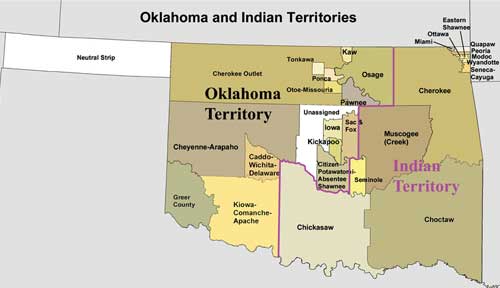
A map of the Indian territory lands that were made available to white settlement by the notorious Jerome commission. Though later ruled unlawful and a violation of federal trust responsibilities to Indian nations, as in many other similar cases, the land was already settled by non-Indians by the time the rulings made their way through the courts.
The Jerome Commission was set up to
negotiate the cession of Indian lands west of the 96th meridian and
to open those lands to white settlement. The commission got
off on the wrong foot when the commissioners told the assembled
tribes that the "government wants nothing from you."
Indians had long since
realized that the white man viewed them as complete fools.
click here for more
The late legendary
legal scholar, David Getches, has argued that the commission came
to the bargaining table with fixed conceptions regarding private
property. Privately held land had a higher status than
commons in white society. The commission was still eager to
press the Indians into programs of assimilation, and to abandon its
communal ways. To that extent, members of the Jerome
Commission were intent on declaring tribal governments as being
invalid institutions. This was the same argument made ninety
years earlier by southern states - one that would resurface
in the Termination Era in the 1950s.
The Kiowa, who
were present at these talks, wanted nothing more than the
government to honor the agreements in the 1867 treaty. The
government refused, but the negotiations went back and forth for 12
years, stalling the implementation of the Allotment Era until
1900.
A Kiowa named
Lone Wolf then sued the government to enjoin it from opening Kiowa
lands to allotment. His lawyer filed a request for an
injunction, asking the court to prevent the Interior Department
from implementing the General Allotment Act. Lone Wolf argued
that this unilateral federal action would deprive the tribe of its
treaty-protected lands, but his request was denied. The judge
explained that it was Congress's prerogative to allot any Indian
reservation regardless of the alleged misunderstandings or
deceptions perpetrated by treaty commissioners. Only Congress
had the power to decide this issue, therefore, Lone Wolf's due
process objections to the forced allotment and the sale of his
lands should be dealt with by the body that could balance the
competing public interest against the rights of the tribes.
The legalities
were made moot by the fact that while the case was making its way
to the U.S. Supreme Court, more than 150,000 homesteads were marked
out in what had been Kiowa and Comanche territory. It
came as no surprise when the highest court of appeals in the land
affirmed the lower court's
ruling.
Related Events
Related Flashpoints